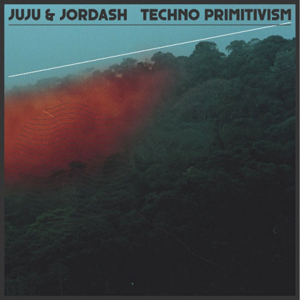Juju & Jordash Techno Primitivism
While many artists struggle to play with the structure of house, Juju & Jordash have […]

While many artists struggle to play with the structure of house, Juju & Jordash have always done it with ease. Some of this can probably be attributed to the Amsterdam-based duo’s roots in the boundary-pushing world of experimental jazz. Going back to the wandering, dubby atmosphere of the pair’s 2005 debut, The Hush EP, that spirit has always been detectable. Since then, the group has explored a lot of ground, oscillating between the off-kilter side of deep house and a variety of appropriated forms: Claudio Simonetti-style horror music (“Unleash the Golem”), driving old-school techno (“Bleached Roots”), and even late-night Balearica (“Tattoo’s Island”). Techno Primitivism, the producers’ latest LP on Dekmantel, follows in this general direction, acting like an extended journey through the duo’s many guises.
As one might imagine from the title, the LP is dominated by an aesthetic that could be described as “primitivist.” However, that might be misleading, because the album features the same live-played looseness that’s come to characterize much of the duo’s catalog. That extends to its usage of non-synthesized sounds provided by guitars, pianos, and live drums, which all lend the experience a certain human (and maybe by extension “primitive”) touch. This choice helps to glue everything together; the LP feels like a coherent statement with a stable narrative running through every stylistic deviation.
“Stoplight Loosejaw” starts the record off in a suspended environment of delay smear, with far-off voices met by dark piano chords and an overpowering kick-drum pulse. Slowly, the spaced-out ambiance is illuminated by warm rushes of synthesized color and hits of pitch-bent lead. This invocatory opener soon gives way to “Diatoms,” an exercise in arpeggiation that almost feels like a less proggy cover of Pink Floyd’s “On The Run.” Here, the pianos and voices make their return as atmospheric embellishment, taking the form of weird noises that mix with feedback to provide interest-sustaining accompaniment to the bubbling notes below. The a-side ends with a left turn into “Backwash,” a rock-and-roll track that sounds like a jammy attempt at swamp boogie similar to the Map of Africa project; its unstructured riffs and “Planet Caravan” bongos acting as a segue into the burnout ’80s vibe of “Rogue Wave.” Complete with gated snares and slowly detuning synthesizers, it’s given a loose feel by the inclusion of a lone guitar that sounds like it belongs on a Police album.
Dub production plays a large role in the overall feeling of the record. Whereas “Rogue Wave” hints at a Jamaican influence, other tracks like the melodica-driven “Shakshuka Dub” and the spacious Sly & Robbie-style “Way of the Road” both approach dub more directly. The latter in particular sounds like an unearthed reel-to-reel from Compass Point Studios, its jazz-fusion chords and spacey guitar laying down the soundtrack for a mythic and epically drugged Caribbean sunset. But it’s not just in the obvious spots where the dub undercurrent resides; it turns up in odd places, even adding a consistent finish to the record’s more electronic fare.
The reference to techno in the title seems somewhat obscure. Those few people coming to this LP expecting something that conforms to the norms of that genre will find themselves disappointed. Instead, the less-live material on this record approaches the kind of jazzy and beat-down style of techno that one might expect from Theo Parrish or Marcellus Pittman. This side of the record might be best heard through “Techno Primitivism,” a paranoid cut that marries moody and detuned pads with a gruff electro-funk bassline.
However, to analyze the isolated moments does the greater experience a disservice. What makes this sprawling record so good is that it manages to cover so much ground without overreaching. Nothing feels out of place, and taken as a whole, the LP feels like the most the duo has done towards mapping just how far out its sound goes.

